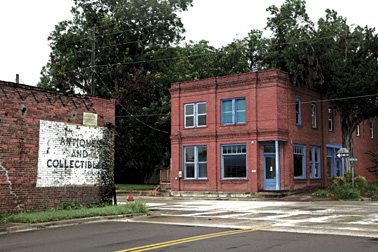BOB BROWN/Alachua County Today
Waldo has a rich past, but recent times haven't been as kind as closures of the city's police department and public school have dealt serious blows to the community that once served as a bustling hub of trade and commerce.
WALDO – A tiny city most recently noted for its large flea market and a now-defunct speed trap, Waldo has a far richer history than many people may realize.
“Waldo’s history has had many ups and downs,” said Waldo City Manager Kim Worley via email. “Right now we are experiencing a down, so we are hoping that the upswing is on its way.”
Two significant events have negatively impacted the small but tight-knit community in the last two years. First, the city police department was dissolved in 2014 in the wake of illegal ticket quota allegations, and second, the Waldo Community School was closed by the Alachua County School Board at the end of the 2014-2015 school year because of low enrollment.
“Waldo residents really come together in a crisis to help their neighbors, and we all stick together,” Worley said. “We are not perfect, but we do pretty good.”
If Waldo’s older, deep history can be relived, prospects for the community would surely look promising.
The area around Waldo was one of the earliest settled by Americans in present day Alachua County. The first federal highway, the Bellamy Road, passed nearby in 1824, and an important Second Seminole War fort – Fort Harlee – was built slightly north along the Santa Fe River in 1837.
According to Jess Davis’ seminal work “History of Alachua County: 1824-1969,” Waldo began to grow in importance when the first cross-state railway – David Yulee’s Florida Railroad running from Fernandina Beach to Cedar Key – passed through in 1859. The rail also ran through Gainesville and Archer on its way to Florida’s west coast.
During the Civil War, a local Confederate company commanded by Captain John Dickison had its camp stationed near Waldo for a time. Dickison was the officer in charge of Confederate forces during the 1864 Battle of Gainesville.
A Florida Historical Marker off of State Road 24 even notes that Confederate President Jefferson Davis’ personal baggage and government records were seized by Union forces at a nearby house after the Confederate surrender in 1865.
The golden era of Waldo began not long after the Civil War’s conclusion. The citrus industry was particularly strong in the area, and two canals were completed in 1879 that connected Waldo directly to Lake Alto, then Alto to Lake Santa Fe, which created a water route connecting Waldo to Melrose.
According to another Florida Historical Marker located on Southwest 5th Boulevard in Waldo, the Santa Fe Canal Company established its headquarters in Waldo and started a lucrative freight and passenger service with a steamship traversing the route between Waldo and Melrose.
The Peninsular Railroad completed a line through Waldo in 1881, making it an important railway junction with the existing Florida Railroad line. Waldo became home to several railroad shops and a division headquarters for the Seaboard Air Line Railway.
Waldo’s prosperity took a severe hit along with other North Florida communities dependent on the citrus industry when hard freezes, one in 1886 and others in 1894-1895, ruined the citrus groves and led to the abandonment of the industry in the area.
Beginning in 1929 with the Great Depression, the rail industry also gradually began to decline in Waldo. The railroad shops and division headquarters were soon moved, and Waldo’s economy became primarily dependent on agriculture.
Today, the Waldo Farmer’s Flea Market is perhaps the most popular draw for visitors, but City Manager Worley sees additional reasons to spur Waldo’s growth in the near future.
“The bypass around Starke scheduled to be completed by 2019 will really change Waldo and bring growth this direction,” she said, referencing the Florida Department of Transportation’s (FDOT) planned bypass on U.S. Highway 301 around the City of Starke. U.S. 301 is one of two major highways, along with State Road 24, that run through Waldo.
“If FDOT will work with Waldo, we would like to do a downtown rehab,” Worley added. “However, the holdup is that downtown literally sits in the middle of [State Road] 24, which is a very busy highway with fast traffic [and] not much parking. So we are kicking around ideas to make changes that will make the Downtown walkable.”
Worley sees downtown revitalization as important to Waldo’s future.
“If we can get the town looking better, I think that will help get the excitement built back up,” she said.
# # #
Email Dwisener@
alachuatoday.com
Communities in Profile: City of Waldo
Tools
Typography
- Font Size
- Default
- Reading Mode


